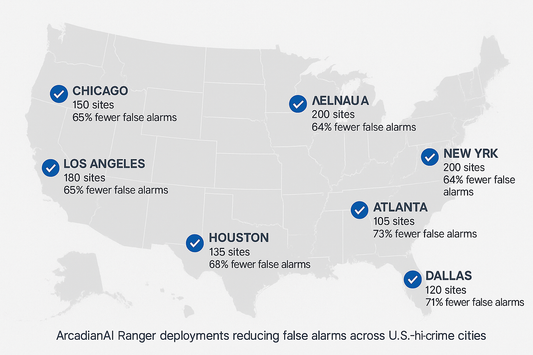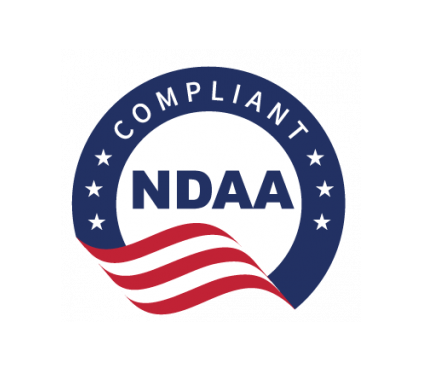The Hidden Cost of Cheap Cameras: NDAA Bans, Chinese OEM Secrets, and the Future of Video Surveillance
Think your cameras are safe? Think again. The NDAA ban exposes how Hikvision, Dahua, and their OEM partners secretly power thousands of “trusted” brands. Here’s what you need to know.
Introduction
In 2019, the United States government drew a line in the sand. Tucked into the National Defense Authorization Act (NDAA) was a warning and a mandate: stop buying Chinese surveillance equipment. The law specifically banned five Chinese technology giants — Hikvision, Dahua, Huawei, ZTE, and Hytera — from supplying video surveillance, telecom, and communication systems to federal agencies.
This wasn’t paranoia. It was response. Years of evidence, security audits, and intelligence reports revealed that cameras from Hikvision and Dahua weren’t just watching buildings — they were watching us back.
But the real danger wasn’t only the obvious. It was the hidden web of OEMs (Original Equipment Manufacturers). You didn’t need to buy a Hikvision-branded camera to get one — you could unknowingly pick one up at Costco, Home Depot, or Amazon under familiar labels like Lorex, Honeywell, IC Realtime, Interlogix, or even FLIR. Businesses believed they were secure because the brand logo on the box wasn’t Chinese. In reality, the chipsets, firmware, and vulnerabilities still were.
Competitors like Verkada, Genetec, Eagle Eye Networks, and Milestone have raced to present themselves as safe alternatives. But here’s the reverse-thinking truth: compliance isn’t a brand, it’s a mindset. ArcadianAI, with our camera-agnostic, NDAA-compliant AI assistant Ranger, doesn’t sell false confidence — we enforce real compliance, now and into the future.
The message is simple: cheap cameras aren’t just cheap — they’re dangerous.
Quick Summary / Key Takeaways
-
NDAA bans five Chinese tech firms over espionage concerns.
-
Hikvision & Dahua secretly power “trusted” OEM brands like Lorex and Honeywell.
-
FCC, FBI, and DoD documented backdoors and firmware risks.
-
Non-compliance can void grants, contracts, and insurance coverage.
-
ArcadianAI ensures NDAA compliance with a camera-agnostic, cloud-native platform.
Background & Relevance
The global surveillance market is dominated by China. According to Statista (2024), over 80% of the world’s CCTV cameras are manufactured in China, with Hikvision and Dahua collectively holding nearly 50% of global market share.
At first glance, this dominance looks like efficiency. But when you peel back the layers, it’s state control masquerading as innovation. Both Hikvision and Dahua are partially state-owned by the Chinese government, raising alarm about whether “consumer cameras” double as espionage infrastructure.
The U.S. Federal Communications Commission (FCC) now maintains a Covered List of banned vendors (Hikvision, Dahua, Huawei, ZTE, Hytera). The FBI has issued multiple warnings about vulnerabilities. In 2023, the Department of Defense labeled Hikvision and Dahua as “Chinese military companies.”
The implications for businesses are direct and chilling: if you bought a cheap camera through an OEM, you may already be in violation of NDAA — and worse, you may have unwittingly invited foreign backdoors into your network.
Core Exploration
What Is the NDAA Ban Really About?
The NDAA ban (Section 889) prohibits federal agencies, contractors, and grant recipients from using equipment from banned companies. But this isn’t just government paranoia. It’s rooted in real risks:
-
Backdoors in firmware discovered in Hikvision and Dahua devices.
-
Hardcoded passwords that allowed attackers worldwide to access cameras.
-
Chinese cloud servers where video could be routed or intercepted.
-
State ownership links raising questions about CCP influence in corporate decisions.
When you buy banned hardware, you’re not just cutting costs — you’re buying uncertainty.
The Banned Brands (Naming Names)
-
Hikvision (Hangzhou Hikvision Digital Technology Co.)
-
Largest CCTV manufacturer in the world.
-
42% owned by China’s state-owned enterprises.
-
Found in U.S. schools, police departments, and even Army bases before the ban.
-
-
Dahua Technology
-
Rival to Hikvision, with similar state ties.
-
Cheap products pushed aggressively through Amazon, Walmart, and Best Buy.
-
2017 vulnerability: hard-coded credentials allowed global access.
-
-
Huawei
-
Telecom giant, accused of embedding espionage tools in 5G gear.
-
Banned in dozens of countries.
-
-
ZTE
-
Sanctioned multiple times for selling to Iran and North Korea.
-
Banned under NDAA for core telecom risk.
-
-
Hytera
-
Radio communications company.
-
Indicted by the FBI for intellectual property theft from Motorola.
-

The Hidden Web of OEM Brands
The most dangerous myth is: “We don’t use Hikvision or Dahua, so we’re safe.”
False. Here are some of the OEM rebrands buyers need to know:
| Retail/OEM Brand | True Manufacturer | NDAA Risk Level | Notes |
|---|---|---|---|
| Lorex (Costco, Best Buy) | Dahua | High | Dahua-owned, now banned. |
| IC Realtime | Hikvision OEM lines | High | Marketed as “U.S.-based.” |
| Honeywell (legacy lines) | Hikvision OEM | High | Older models non-compliant. |
| Interlogix (GE Security) | Chinese OEMs | High | Discontinued in 2019. |
| FLIR (select models) | Hikvision OEM | High | Pre-acquisition consumer lines. |
| ADT-branded cameras (legacy) | Dahua OEM | High | Discovered in federal audits. |
👉 Reverse thinking: That camera with a trusted Western logo may actually be a Chinese device in disguise.
Why Cheap Isn’t Safe
Cheap cameras lower upfront cost but create hidden liabilities:
-
Cyber risk: Known backdoors exploited in ransomware campaigns.
-
Compliance risk: NDAA bans can void federal funding or contracts.
-
Insurance risk: Insurers may refuse claims if banned tech is in use.
-
Reputation risk: Being caught with banned cameras = headlines about negligence.
Reverse thinking: the cheapest camera today may be the most expensive mistake tomorrow.
How U.S. Agencies Reacted
-
FCC (2021–2023): Added Hikvision, Dahua, Huawei, ZTE, Hytera to Covered List.
-
FBI (2022): Warned about Hikvision cameras near military installations.
-
DoD (2023): Identified Hikvision & Dahua as “Chinese military companies.”
-
UK, Canada, Australia (2022–2023): Banned Hikvision/Dahua from government buildings.
Competitor Claims vs. Reality
-
Verkada: Cloud-native, NDAA-compliant, but closed ecosystem. Vendor lock-in risk.
-
Eagle Eye Networks: Cloud-first, but resellers may still install non-compliant cameras.
-
Genetec & Milestone: VMS giants, but dependent on integrators (weak NDAA enforcement).
-
ArcadianAI: Camera-agnostic, NDAA compliance enforcement, existing camera compatibility.
Case Studies of Non-Compliance
-
Texas School District (2022): Bought Honeywell-branded Hikvision OEM cameras. Forced to replace at taxpayer cost.
-
Florida Municipality (2023): Lost federal grant after Dahua cameras discovered.
-
Midwest Retail Chain (2024): Lorex cameras flagged as non-compliant; entire system ripped out.
The Coming Crackdown
By 2025, NDAA bans are expanding. Canada, UK, and Australia already follow suit. Expect private insurers and compliance auditors to start scanning networks for banned devices.
ArcadianAI anticipates this future — our AI compliance checker identifies banned OEM devices before auditors do.
Comparisons & Use Cases
| Feature | Chinese OEM (Hikvision/Dahua) | Competitors (Verkada/Eagle Eye) | ArcadianAI |
|---|---|---|---|
| NDAA Compliance | ❌ Non-compliant | ✅ Limited | ✅ Enforced by AI |
| OEM Risk | High | Medium | None |
| Vendor Lock-in | Low (cheap) | High | None (camera-agnostic) |
| Long-term ROI | Negative (rip-out risk) | Moderate | High (future-proof) |
FAQ (SEO-Optimized)
Q1: Which cameras are banned under NDAA?
Hikvision, Dahua, Huawei, ZTE, and Hytera, plus their OEM brands like Lorex and IC Realtime.
Q2: Is Lorex NDAA compliant?
No. Lorex is owned by Dahua and banned under NDAA.
Q3: What happens if I use Hikvision or Dahua cameras?
You risk federal contract loss, grant revocation, cyber exposure, and forced replacement.
Q4: How can I check if my cameras are NDAA compliant?
Check the FCC Covered List, or use ArcadianAI’s compliance audit tool.
Q5: Why is ArcadianAI safer?
ArcadianAI is camera-agnostic, NDAA-compliant, and future-proof, unlike OEM-based vendors.
Conclusion & CTA
The world’s cheapest cameras may also be the world’s most dangerous. Hikvision, Dahua, and their OEM partners have turned cost-cutting into a Trojan horse strategy. Governments have noticed. Businesses can no longer ignore it.
ArcadianAI stands apart: camera-agnostic, NDAA-compliant, and built for the future of AI-driven surveillance.
Don’t wait until auditors, insurers, or regulators tell you to rip out your system.
👉 See ArcadianAI in Action → Get Demo – ArcadianAI
Security Glossary (2025 Edition)
-
NDAA — U.S. law banning Chinese surveillance tech.
-
Section 889 — NDAA clause prohibiting covered telecom and video gear.
-
OEM (Original Equipment Manufacturer) — When banned tech is resold under another brand.
-
Hikvision — World’s largest CCTV maker, CCP-linked.
-
Dahua — Chinese surveillance giant, FCC-banned.
-
Lorex — Dahua OEM brand sold in U.S. retail.
-
Backdoor — Hidden software/hardware access enabling cyberattacks.
-
FCC Covered List — List of vendors deemed insecure by U.S. government.
-
False Compliance — Claiming NDAA safety while using OEM-banned gear.
-
Camera Agnostic — ArcadianAI’s design: support NDAA-safe cameras only.
-
VSaaS — Video Surveillance as a Service.
-
VMS — Video Management Software, often blind to NDAA issues.
-
Genetec/Milestone — VMS leaders, limited NDAA enforcement.
-
Verkada/Eagle Eye — Cloud competitors, potential vendor lock-in.
-
ArcadianAI Ranger — AI assistant enforcing NDAA compliance and real-time threat detection.

Security is like insurance—until you need it, you don’t think about it.
But when something goes wrong? Break-ins, theft, liability claims—suddenly, it’s all you think about.
ArcadianAI upgrades your security to the AI era—no new hardware, no sky-high costs, just smart protection that works.
→ Stop security incidents before they happen
→ Cut security costs without cutting corners
→ Run your business without the worry
Because the best security isn’t reactive—it’s proactive.






